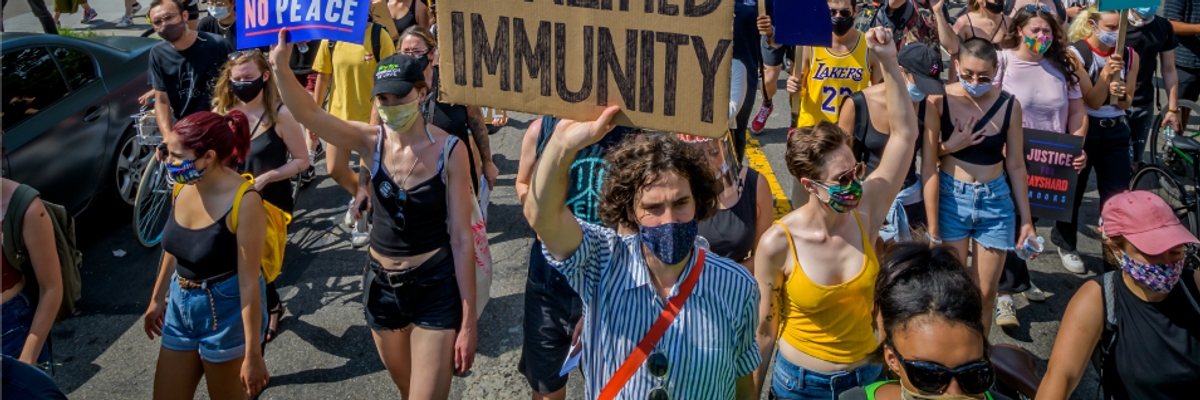The New York City Council on Thursday approved several police department reform measures including curbing the use of qualified immunity--changes civil rights advocates said represented a good step but ultimately not the major overhaul needed.
"The mayor's plan is a far cry from the transformative change New Yorkers demanded in the streets and at the polls: it is, simply put, more of the same," said New York Civil Liberties Union senior policy counsel Michael Sisitzky.
According to a statement from the council, the bill regarding the doctrine that had shielded police officers from civil lawsuits "will effectively end qualified immunity as a defense for certain civil rights violations" by establishing "a new local civil right protecting New Yorkers against unreasonable search and seizures and against excessive force and ban the use of qualified immunity, or substantially equivalent immunities, as a defense."
The measure was sponsored by Council Member Stephen Levin, who said the "legislation is simple--it creates a set of civil rights here in New York City, mirroring those conferred by the 4th and 14th Amendments of the U.S. Constitution, so that people in New York City can hold officers accountable if those officers violate their civil rights." He asserted that it removes "the shield of qualified immunity to allow victims the opportunity to seek justice."
Council Speaker Corey Johnson welcomed the measure's passage, tweeting that "qualified immunity denied Freedom Riders justice and has been used to deny justice to victims of police abuse for decades. It should never have been allowed, but I'm proud that we took action today to end it here in NYC."
That conclusion, however, was criticized by Molly Griffard, staff attorney with the New York City-based Legal Aid Society. She responded to Johnson with a tweet saying that while "this is a good step... the @nyccouncil did not END qualified immunity in NYC."
"They left it in place for corrections guards and for everything besides 4th Amendment violations (so cops can still claim QI in 1A abuses of protesters & 14A racial discrimination cases)," she explained.
And, as The New York Timesreported:
Even as the council moved to curb the use of qualified immunity, the city Law Department indicated recently that it would use the defense in lawsuits being brought by state Attorney General Letitia James and others accusing the Police Department of using excessive force against protesters during the Floyd protests last summer...
City lawyers said in a Feb. 15 letter to Judge Colleen McMahon that the qualified immunity defense would apply because the protests happened during the coronavirus pandemic.
Robert Quackenbush, staff attorney with the Prisoners' Rights Project at The Legal Aid Society, called on (pdf) lawmakers to pass statewide legislation to advance justice for victims of police abuse.
"The culture of impunity that has been allowed to exist and fester within the New York City Police Department is in part due to the doctrine of qualified immunity, which shields even the worst officers from legal liability and prevents victims of police abuse from getting justice in court," Quackenbush said in a statement.
"This introduction is long overdue and a solid first step, but it should not supplant the need for statewide legislation," he continued, and pointed to the need to "provide comprehensive relief to victims of police and corrections officer misconduct."
Council members on Thursday also approved Mayor Bill DeBlasio's policing reform plan that stemmed from a state executive order, as CNNreported:
This includes allowing the Civilian Complaint Review Board (CCRB) to investigate police with a history of bias and racial profiling complaints, as well as giving the board final authority on discipline recommendations for officers. Previously, the police commissioner had the right to disregard recommendations, which was a point of concern during the internal review of Officer Daniel Pantaleo regarding the death of Eric Garner.
Other legislation passed includes mandating a quarterly report on all traffic stops, the Department of Transportation taking over investigations for all crashes involving serious injury and requiring new officers to live within city lines. Press passes for media outlets will now be issued through the Mayor's Office of Media and Entertainment instead of by the NYPD as well. The set of legislation was formed over a "months-long engagement process" with the New York City Police Reform and Reinvention Collaborative, which worked with the input of stakeholders, experts and the community, Mayor Bill de Blasio's office said.
In a Thursday statement ahead of the vote, the Center for Constitutional Rights (CCR) had urged the council to reject "all portions of the New York City Police Reform and Reinvention Collaborative plan that would expand police funding and reach through programs with no track record of fixing the problem of racially discriminatory policing and that are likely to make the problem worse."
CCR was among the scores of signatories to letter to council members Thursday that took issue with the process that led to the mayor's policing plan.
The group wrote, "Many of the items will result in an increase in the budget, personnel, consultants, scope, size, and power of the NYPD and policing in NYC."
"A number of items will," the letter added, "create a system of monetary incentives to community groups, consultants, and others to legitimize the outsized role of the NYPD and policing-instead of questioning why the NYPD and policing have such massive footprints in the lives of so many Black, Latinx, and other communities of color."
NYCLU's Sisitzky, in his statement, urged the city council to "return to the real work of reducing the impact of police violence by investing in communities."

